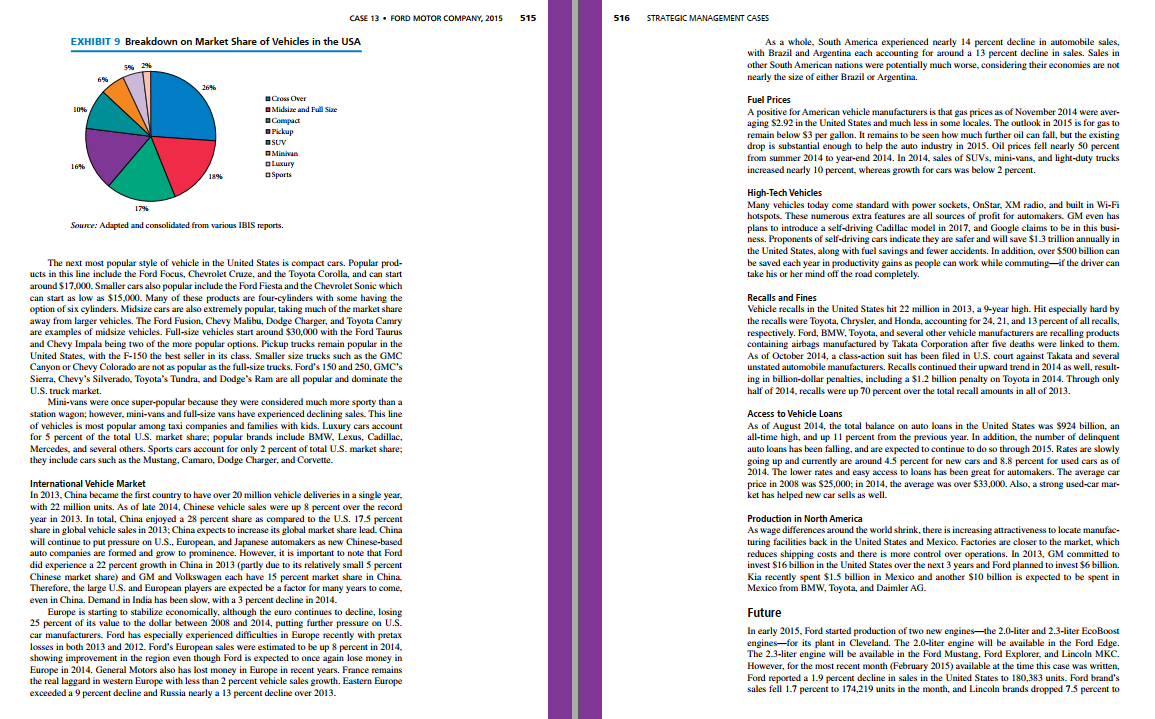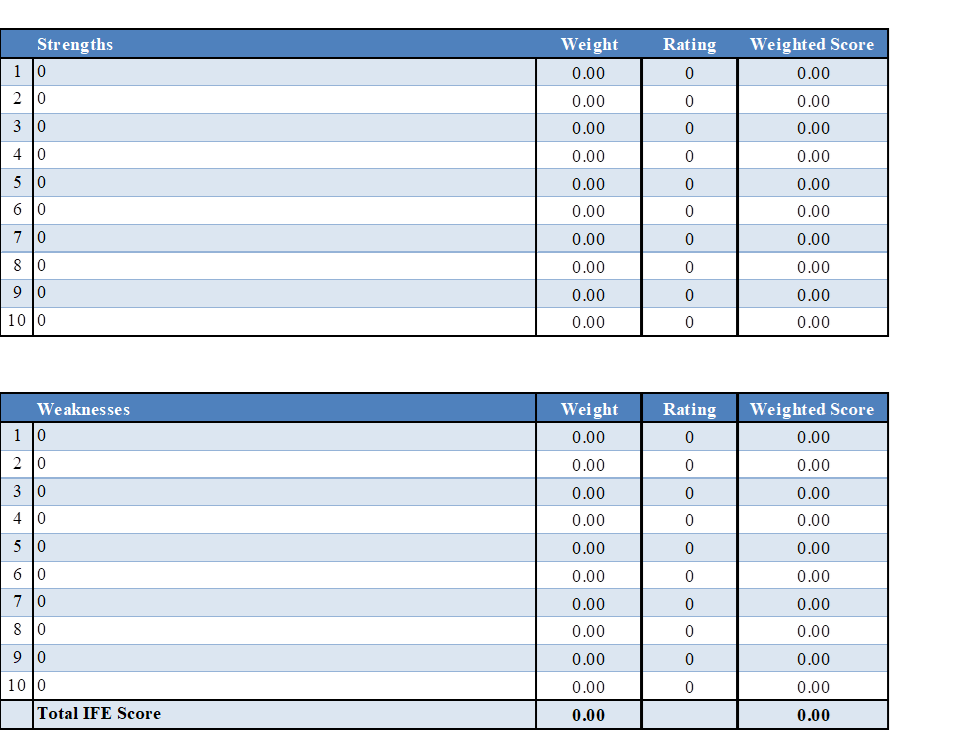Answered step by step
Verified Expert Solution
Question
1 Approved Answer
QUESTIONS: Analysis of all FORD MOTOR COMPANY internal functions including 1/ The IFE matrix ( 10 factors each for Strengths & Weaknesses ) must be


QUESTIONS:
Analysis of all FORD MOTOR COMPANY internal functions including
1/ The IFE matrix (10 factors each for Strengths & Weaknesses) must be completed

2/ Marketing:
a/ Customer analysis
b/ Selling products and services
c/ Product and service planning
d/ Pricing
e/ Distribution
g/ Marketing research
h/ Cost/Benefit Analysis
Three steps are required:
- compute the total costs associated with a decision
- estimate the total benefits from the decision
- compare the total costs with the total benefits
CASE 13 - FORD MOTOR COMPANY, 2015 515 EXHIBIT 9 Breakdown on Market Share of Vehicles in the USA Soure: Adapted and consolidated from various IBIS reports. The next most popular style of vehicle in the United States is compact cars. Popular products in this line include the Ford Focus, Chevrolet Cruze, and the Toyota Corolla, and can start around $17,000. Smaller cars also popular include the Ford Fiesta and the Chevrolet Sonic which can start as low as $15,000. Many of these products are four-cylinders with some having the option of six cylinders. Midsize cars are also extremely popular, taking much of the market share away from larger vehicles. The Ford Fusion, Chevy Malibu, Dodge Charger, and Toyota Camry are examples of midsize vehicles. Full-size vehicles start around $30,000 with the Ford Taurus and Chevy Impala being two of the more popular options. Pickup trucks remain popular in the United States, with the F-150 the best seller in its class. Smaller size trucks such as the GMC Canyon or Chevy Colorado are not as popular as the full-size trucks. Ford's 150 and 250, GMC's Sierra, Chevy's Silverado, Toyota's Tundra, and Dodge's Ram are all popular and dominate the U.S. truck market. Mini-vans were once super-popular because they were considered much more sporty than a station wagon; however, mini-vans and full-size vans have experienced declining sales. This line of vehicles is most popular among taxi companies and families with kids. Luxury cars account for 5 percent of the total U.S. market share, popular brands include BMW, Lexus, Cadillac, Mercedes, and several others. Sports cars account for only 2 percent of total U.S. market share; they include cars such as the Mustang, Camaro, Dodge Charger, and Corvette. International Vehicle Market In 2013 , China became the first country to have over 20 million vehicle deliveries in a single year, with 22 million units. As of late 2014, Chinese vehicle sales were up 8 percent over the record year in 2013. In total, China enjoyed a 28 percent share as compared to the U.S. 17.5 percent share in global vehicle sales in 2013; China expects to increase its global market share lead. China will continue to put pressure on U.S., European, and Japanese automakers as new Chinese-based auto companies are formed and grow to prominence. However, it is important to note that Ford did experience a 22 percent growth in China in 2013 (partly due to its relatively small 5 percent Chinese market share) and GM and Volkswagen each have 15 percent market share in China Therefore, the large U.S. and European players are expected be a factor for many years to come. even in China. Demand in India has been slow, with a 3 percent decline in 2014. Europe is starting to stabilize economically, although the euro continues to decline, losing 25 percent of its value to the dollar between 2008 and 2014 , putting further pressure on U.S. car manufacturers. Ford has especially experienced difficulties in Europe recently with pretax losses in both 2013 and 2012. Ford's European sales were estimated to be up 8 percent in 2014. showing improvement in the region even though Ford is expected to once again lose money in Europe in 2014. General Motors also has lost money in Europe in recent years. France remains the real laggard in western Europe with less than 2 percent vehicle sales growth. Eastern Europe exceeded a 9 percent decline and Russia nearly a 13 percent decline over 2013. 516 STRATEGIC MANAGEMENT CASES As a whole, South America experienced nearly 14 percent decline in automobile sales, with Brazil and Argentina each accounting for around a 13 percent decline in sales. Sales in other South American nations were potentially much worse, considering their economies are not nearly the size of either Brazil or Argentina. Fuel Prices A positive for American vehicle manufacturers is that gas prices as of November 2014 were averaging \$2.92 in the United States and much less in some locales. The outlook in 2015 is for gas to remain below $3 per gallon. It remains to be seen how much further oil can fall, but the existing drop is substantial enough to help the auto industry in 2015 . Oil prices fell nearly 50 percent from summer 2014 to year-end 2014. In 2014, sales of SUVs, mini-vans, and light-duty trucks increased nearly 10 percent, whereas growth for cars was below 2 percent. High-Tech Vehicles Many vehicles today come standard with power sockets, OnStar, XM radio, and built in Wi-Fi botspots. These numerous extra features are all sources of profit for automakers. GM even has plans to introduce a self-driving Cadillac model in 2017, and Google claims to be in this business. Proponents of self-driving cars indicate they are safer and will save $1.3 trillion annually in the United States, along with fuel savings and fewer accidents. In addition, over $500 billion can be saved each year in productivity gains as people can work while commuting-if the driver can take his or her mind off the road completely. Recalls and Fines Vehicle recalls in the United States hit 22 million in 2013, a 9-year high. Hit especially hard by the recalls were Toyota, Chrysler, and Honda, accounting for 24,21 , and 13 percent of all recalls. respectively. Ford, BMW, Toyota, and several other vehicle manufacturers are recalling products containing airbags manufactured by Takata Corporation after five deaths were linked to them. As of October 2014, a class-action suit has been filed in U.S. court against Takata and several unstated automobile manufacturers. Recalls continued their upward trend in 2014 as well, resulting in billion-dollar penalties, including a $1.2 billion penalty on Toyota in 2014. Through only half of 2014 , recalls were up 70 percent over the total recall amounts in all of 2013. Access to Vehicle Loans As of August 2014, the total balance on auto loans in the United States was $924 billion, an all-time high, and up 11 percent from the previous year. In addition, the number of delinquent auto loans has been falling, and are expected to continue to do so through 2015 . Rates are slowly going up and currently are around 4.5 percent for new cars and 8.8 percent for used cars as of 2014. The lower rates and easy access to loans has been great for automakers. The average car price in 2008 was $25,000; in 2014 , the average was over $33,000. Also, a strong used-car market has helped new car sells as well. Production in North America As wage differences around the world shrink, there is increasing attractiveness to locate manufacturing facilities back in the United States and Mexico. Factories are closer to the market, which reduces shipping costs and there is more control over operations. In 2013, GM committed to invest $16 billion in the United States over the next 3 years and Ford planned to invest $6 billion. Kia recently spent $1.5 billion in Mexico and another $10 billion is expected to be spent in Mexico from BMW, Toyota, and Daimler AG. Future In early 2015, Ford started production of two new engines-the 2.0-liter and 2.3-liter EooBoost engines-for its plant in Cleveland. The 2.0-liter engine will be available in the Ford Edge. The 2.3-liter engine will be available in the Ford Mustang, Ford Explorer, and Lincoln MKC. However, for the most recent month (February 2015) available at the time this case was written, Ford reported a 1.9 percent decline in sales in the United States to 180,383 units. Ford brand's sales fell 1.7 percent to 174,219 units in the month, and Lincoln brands dropped 7.5 percent to 6,164 units. All total for the month, sales of Ford cars and utility vehicles fell 8.1 and 2.3 percent to 56,081 and 54,420 units, respectively. However, Ford's truck sales increased 4 percent, led by a 24.6 and 18.7 surge in sales of the Transit Connect and heavy trucks, respectively. Retail sales of the F-series fell 1.2 percent in February. Even Ford's two most popular two vehicles, the Focus and the Fusion, recorded a year-over-year decline in sales. The Ford Escape reported a 9.6 decline in sales for the month. A bright spot was the Ford Explorer had a 31.8 percent surge in sales in February 2015. Ford Mustang was the company's only car that reported higher sales during the month, increasing 31.9 percent to 8,454 units in February, making it the Mustang"s best February sales since 2007. Since the launch of the new Mustang model, it has been the highest-selling sports car in America. But overall in February 2015, compared to the prior year period, Ford sharcholders were not pleased with all the declines. Develop a 3-year strategic plan for Ford's new CEO, Mr. Mark Fields
Step by Step Solution
There are 3 Steps involved in it
Step: 1

Get Instant Access to Expert-Tailored Solutions
See step-by-step solutions with expert insights and AI powered tools for academic success
Step: 2

Step: 3

Ace Your Homework with AI
Get the answers you need in no time with our AI-driven, step-by-step assistance
Get Started


